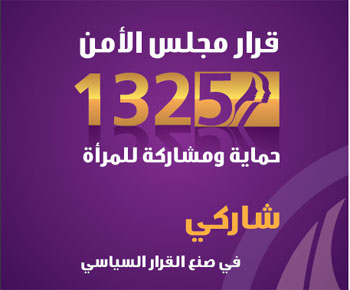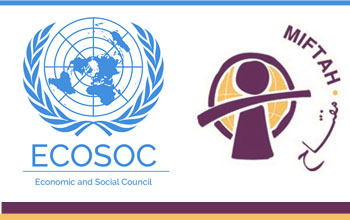
Ramallah – CEO of MIFTAH, Dr. Lily Feidy confirmed that MIFTAH would continue to support efforts by coalitions to implement UN Resolution 1325, which calls for women’s participation in decision-making bodies for peace and security in general and in areas of armed conflict in particular.
On the occasion of 13 years since Resolution 1325 was issued, Feidy said MIFTAH had committed to working on the resolution and that procedures were needed and efforts made by civil society organizations to guarantee the protection of women and girls in the Palestinian territories. “Thirteen years after the resolution was issued, MIFTAH still supports and follows up with the 1325 coalitions in the Nablus and Hebron districts along with the Jericho and Jordan Valley district where we began working at the start of 2011. These coalitions are comprised of civil society organizations within MIFTAH’s project “Gender, Peace and Security” funded by UNFPA. The project stems from the belief that it is necessary to join social and community forces to achieve justice for the Palestinians through awareness and education about this resolution. This could contribute, along with UN resolutions pertaining to the Palestinian cause, to bringing justice to the Palestinian people. “All of the literature published by MIFTAH in this regard can be found at the organization itself or on accessed via its website,” Feidy added.
Director of MIFTAH’s “Protection and equality project from a gender perspective”, Najwa Yaghi said: “Right now, we need the formulation of a national plan to implement this UN resolution to guarantee the participation of women in politics and protect them from human rights violations.” Yaghi pointed out that MIFTAH was the primary initiator for the many activities and training sessions, for explaining about this resolution and for the publication of many booklets on this subject; MIFTAH also formed the coalitions and supported the pressure and advocacy campaign in all of the regions to demand and expedite the implementation of this resolution, which overlaps with the agenda of the Palestinian women’s movement in that it merges between the demands for national liberation and the need of women to achieve comprehensive and just peace and between the requirements and needs of women for social advancement and rights, all of which work towards reinforcing the values of democracy and equality.” Yaghi also said that MIFTAH is currently working on developing a questionnaire to document human rights violation against women within Resolution 1325.
Yaghi explained that since MIFTAH began implementing its plan pertaining to the enactment of the resolution in 2006 until now, it has succeeded in building the capacities of a number of organizations and coalitions with local decision-makers. It has also been able to connect with international organizations working in the field of human rights such as OCHA and OHCHR in addition to offering support in the field of capacity-building for organizations and institutions on documenting human rights violations. These violations against women and girls were documented in Bedouin communities in Hebron and the Jordan Valley in addition to places in Area C of the West Bank. Discussions were held with government institutions on the need for policies that support the protection of women and girls in these areas. Yaghi said MIFTAH’s role was not confined to training and organizing courses for organizations and their staff, and supporting media campaigns to promote the resolution, but it was also able to create pressure and advocacy groups within many of these institutions and coalitions in Hebron, Nablus and other Palestinian cities.
In terms publications on the subject, the most outstanding of them was put together by expert Rima Nazzal for a project funded by MIFTAH and supported by UNFPA. The publication includes important definitions and explanations about the role of the UN in supporting women’s efforts and also the reality of Palestinian women, who have been the direct victims of the Israeli occupation. Furthermore, it addresses the importance of the resolution at the Palestinian level, its points of weakness and the problems and obstacles facing the implementation of this resolution in Palestine. Another important publication was the guidebook prepared by Nazzal with support from the Austrian Representative Office.
Nazzal says in her guidebook, entitled “Palestinian Women and Resolution 1325” that in order to mainstream and institutionalize this resolution in Palestine, the Palestinian women’s movement must link it through tools used in political and media discourse, to international resolutions which have a direct political dimension; the movement must also demand the implementation of all international resolutions pertaining to the Palestinian cause alongside Resolution 1325.
Nazzal says that in order to utilize the resolution for the sake of Palestinian women’s needs, this requires a comprehensive national plan at the national and social levels, and at the internal and external levels as well to ultimately address all aspects of a Palestinian national plan on the basis of Resolution 1325.
In this regard, Yaghi maintains that MIFTAH built the foundation for an infrastructure to launch the implementation of 1325. In this way, the organizations and coalitions that endorsed it would only have to move forward with their projects to achieve this purpose, which MIFTAH would also continue to support.
A special publication issued by MIFTAH includes mechanisms for which to enact 1325 at three levels: women, politics and at the level of the reconciliation. It documents attacks on Palestinian women including their murder, displacement, uprooting for the sake of settlements, to births at checkpoints and deaths because of the siege. The booklet addresses organizing media campaigns to shed light on the conditions of female prisoners, the demand for their release and the work needed to reintegrate them and rehabilitate them in society. It includes the impact of the occupation and settlements on women’s and children’s health and the environment and also women’s participation at the level of the political process and state building. Furthermore, it addresses the need to pressure decision-makers to pass laws that provide protection for women against social violence in all its forms and the need for organizing media campaigns demanding justice for women.
MIFTAH also released another publication that documented the initiatives taken by 1325 coalitions, including MIFTAH’s experience in putting the UN Resolution on the agenda of member institutions, in addition to its success in bringing together various sectors of society in interacting with Palestinian women’s issues.






